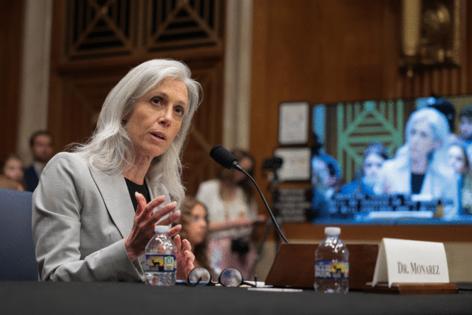Fired CDC employees dispute RFK's testimony to Senate
Published in News & Features
WASHINGTON — During a Senate hearing Wednesday morning, two former leaders of the Centers for Disease Control and Prevention contested Health and Human Services Secretary Robert F. Kennedy’s version of why they departed the agency in August.
“Since my removal, several explanations have been offered: that I told the secretary I would resign; that I was not aligned with the administration’s priorities; or that I was untrustworthy,” former CDC Director Dr. Susan Monarez told the committee.
“None of those reflect what actually happened,” she said.
The Senate held the hearing after the agency spiraled into chaos after Monarez was fired from her position as CDC director on August 27, leading other senior leaders to resign.
Dr. Debra Houry, the agency’s former Chief Medical Officer and deputy director, was one of those leaders.
“Secretary Kennedy censored CDC science, politized its processes, and stripped leaders of independence,” Houry said. “I could not in good conscience remain under those conditions.”
“I resigned because CDC leaders were relegated to rubber stamps,” she added, pointing to several actions that fell short of the “gold standard of science” and “radical transparency.”
Maryland Sen. Angela Alsobrooks, who was the first to call for Kennedy’s resignation, bluntly asked Houry if she believed him to be incompetent and dangerous for Americans’ health.
“I always believe in optimism and hope,” Houry said in response. “After seeing his Senate Finance testimony and the number of misstatements; seeing what he has asked our scientists to do and to compromise our integrity; and the children that have died under his watch, I think he should resign.”
‘The American people need all the facts’
“What happened?” Sen. Bill Cassidy, R-LA, chair of the committee, said during his opening remarks. “The American people need all the facts.”
Monarez was fired 29 days after being confirmed to her position. She was the first Senate-confirmed CDC director.
“She took the radical position that she wanted to examine the scientific facts before drawing conclusions,” Sen. Bernie Sanders, D-VT, the committee’s ranking member, said. “She stood up for protecting the well-being of the American people. And for that reason, she was fired.”
The former director explained the events leading up to her firing.
It started on August 2 with the removal of experts serving on a vaccine advisory panel. The next week, Monarez learned that the panel might alter the childhood vaccine schedule at its September meeting without supporting evidence.
Then, a gunman, skeptical of vaccines, attacked the CDC office in Atlanta, killing DeKalb County Police Officer David Rose.
In the days after the attack, Kennedy’s office notified Monarez that she needed prior approval from her political staff for CDC policy and personnel decisions. On August 21, Monarez defied a directive to return to Washington, DC, telling the committee that she refused to miss Rose’s funeral.
On August 25, after returning to Washington, Kennedy directed Monarez to preapprove the vaccine advisory panel’s recommendations, “regardless of the scientific evidence,” Monarez said. He also told her to dismiss career officials responsible for vaccine policy, though he didn’t tell her why they should be dismissed.
During the meetings, Monarez said Kennedy became animated, comparing it to how he reacted to direct questioning during a recent Senate hearing.
She added that Kennedy had told her not to speak with members of Congress.
At that point, Kennedy told her “he had already spoken with the White House several times about having me removed,” Monarez said.
Senate concerns
Sen. Rand Paul, R-KY, disputed witness answers about vaccine safety, specifically, the COVID-19 vaccines.
When Paul asked if the vaccines reduced the rate of death for children under 18, Monarez responded, “It can” — seemingly thinking Paul said, “risk.”
“What? ‘It can’? That’s a ridiculous answer,” Paul said. “No, it doesn’t, and there is no statistical evidence that it does reduce the death rate.”
When Sen. Jim Banks, R-IN, asked about her alignment with President Donald Trump and Kennedy’s health priorities, Monarez said, “The only thing that changed was the demands that compromised my integrity.”
The former director’s legal team also came under scrutiny, both by Banks and Sen. Ashley Moody, R-FL. During Moody’s questioning, she repeatedly requested that Monarez give the names of her attorneys, which she repeatedly refused to do. Moody repeated her question to Houry, who named Abbe Lowell and Mark Zaid.
Lowell previously represented Hunter Biden and has frequently challenged the Trump administration. Zaid has been critical of the lawfulness of some of Trump’s executive actions.
Meanwhile, multiple Democrats admitted they didn’t believe during her confirmation process that Monarez would stand up to Kennedy about vaccines.
“Doctor Monarez, I owe you an apology,” Sen. Tim Kaine, D-VA, told her. “I had concerns about your backbone. And I was wrong.”
Cassidy also defended Monarez after Moody called her out for calling him about the turmoil at CDC.
“It is entirely appropriate for someone with oversight concerns to contact my office, or me — or frankly any of us,” he said. “As soon as the director was fired, the HELP committee began reviewing the situation, as it is our responsibility.”
Sanders defended the chairman.
“I find it rather astounding that anyone is concerned that government heads of agencies talk to the elected officials of the United States of America,” Sanders said. “That is what they are supposed to do.”
_____
©2025 The Baltimore Sun. Visit at baltimoresun.com. Distributed by Tribune Content Agency, LLC.







Comments